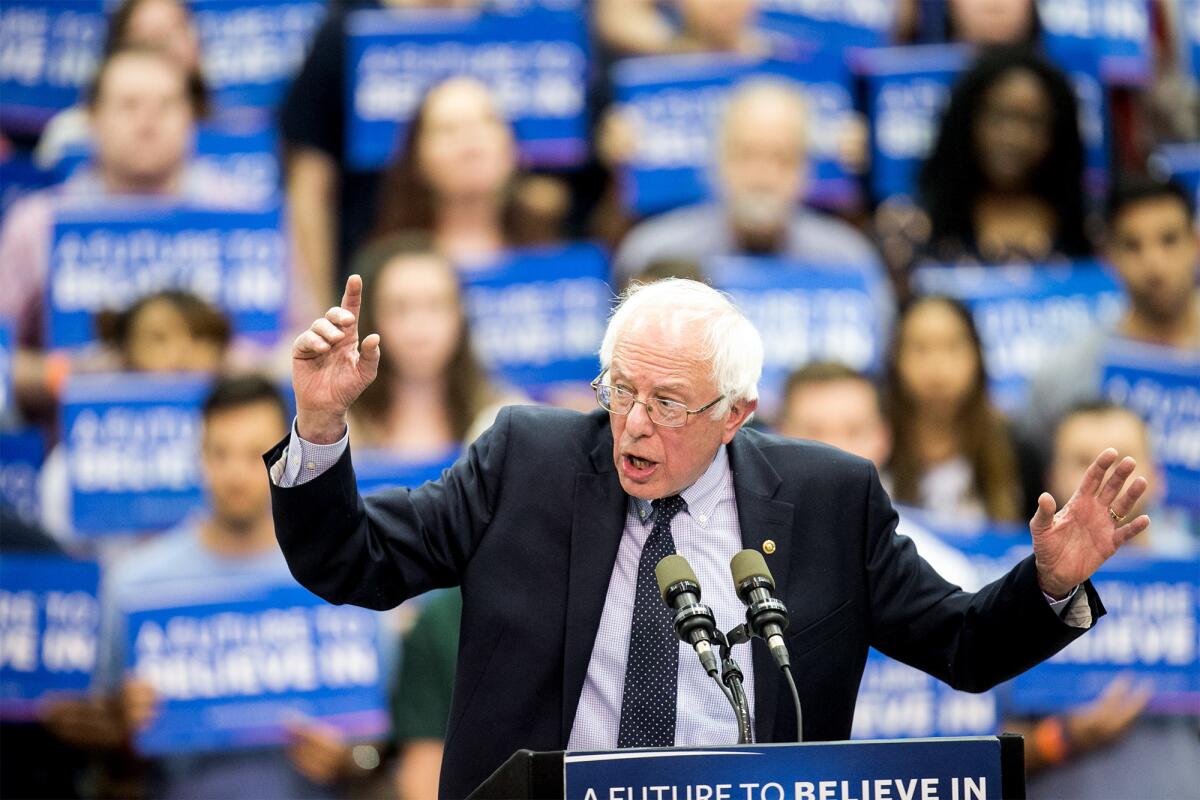Editorial: Sorry Trump and Hillary, the primaries aren’t over till they’re over

U.S. Senator and Democratic Party presidential candidate Bernie Sanders speaks during a rally at Penn State University in State College, Pa. on April 19.
As a famous New Yorker once said, “It ain’t over till it’s over.” And despite what Donald Trump and Hillary Clinton told their supporters at victory rallies in New York City on Tuesday night, the race for the presidential nomination in both parties still isn’t over.
Yes, Trump shut out the No. 2 Republican in the delegate chase, Texas Sen. Ted Cruz, and collected all but a handful of the state’s 95 Republican delegates. It was a beat down, no question about it. For the first time, more than half of the voters in a state primary cast their ballots for Trump, rather than for the candidates running against him.
And yes, Clinton easily defeated Sen. Bernie Sanders, riding a huge wave of support from New York City and its suburbs to overcome Sanders’ edge in almost every county upstate. Her win resoundingly broke Sanders’ streak of seven consecutive primary and caucus victories in March and April.
But New York is Trump’s home state and Clinton’s adopted home. Even Ohio Gov. John Kasich won his own state. And both Trump and Clinton still have much to prove before they can claim their party’s nomination.
The obstacles are most significant for Trump. From a practical perspective, the lingering question is whether such a polarizing candidate who routinely belittles his opponents and alienates voters (even has he wins others to his side) can finally start unifying Republican factions behind him, a process that was well underway for Republican front-runners by this stage in previous presidential races. He’ll need broader support if he hopes to win the remaining primaries and sew up a majority of the party’s delegates on the first ballot at the Republican National Convention in Cleveland this summer. If he doesn’t, he risks watching his delegates defect on later ballots to someone who generates less antipathy in the GOP establishment.
So far, Trump has shown little interest in or aptitude for this kind of coalition building. He’s been content to be the Howard Beale of 2016, running a noisy but often empty campaign against just about anything government has done, whether at the hands of Democrats or Republicans. But the ability to build coalitions isn’t merely a nominee’s burden, it’s a prerequisite for a successful presidency — particularly in an era of polarized parties and divided government. Consider this yet another test of presidential timber that Trump is failing.
Clinton is considerably closer to sealing the Democratic nomination, having outpolled Sanders by about 3 million votes and amassing 1,930 delegates to his 1,189 (2,383 are needed to win the nomination). Yet she owes her big lead in delegates mainly to the overwhelming support from “superdelegates” — elected officials and other party insiders who are free to back the candidate of their choice. The Democratic National Committee established superdelegates more than three decades ago to help retain a degree of control over the nomination, so naturally Sanders’ grass-roots supporters chafe at what they see as the hand of the party establishment tipping the scales. Both they and Trump’s supporters seem to be laboring under the myth that national parties have no role in choosing their nominees.
For their part, Clinton’s backers seem to think that Sanders should stop criticizing her and quietly fold his tent. His chance of winning is so slim, they contend, that all he’s doing is hurting Clinton’s chances of winning in November. And in fact, Sanders’ attacks in recent weeks have left more voters with an unfavorable view of the former secretary of State.
But this is what a primary campaign is about. As this page has said all along, the vetting process of a hard-fought primary is good for voters and candidates alike. The earlier the candidates’ shortcomings get aired and judgment gets questioned, the better voters will know them — and the more likely voters are to pick the one who best reflects their values and who stands the best chance of winning in November. By and large, Sanders has challenged Clinton on substantive issues and their different approaches to government and governing have made for a more thoughtful campaign.
Although her path to the nomination is clearer than Trump’s, Clinton faces a similar undercurrent of doubt from a large segment of her party — particularly younger voters. A CNN exit poll Tuesday found that Sanders captured an astounding 72% of the vote from Democrats younger than 30. That’s another reason for Clinton to want Sanders to keep up the fight. The clearest way to prove that her lead in delegates is deserved is to rack up more wins like she did Tuesday.
Follow the Opinion section on Twitter @latimesopinion and Facebook
More to Read
A cure for the common opinion
Get thought-provoking perspectives with our weekly newsletter.
You may occasionally receive promotional content from the Los Angeles Times.






